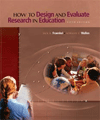 |  How to Design and Evaluate Research in Education, 5/e Jack R. Fraenkel,
San Francisco State University
Norman E. Wallen,
San Francisco State University
Ethics and Research
Main PointsBasic Ethical Principles - Ethics refers to questions of right and wrong.
- There are a number of ethical principles that all researchers should be are of and apply to their investigations.
- The basic ethical question for all researchers to consider is, "Will any physical or psychological harm come to anyone as a result of my research?"
- All subjects in a research study should be assured that any data collected from or about them will be held in confidence.
- The term "deception," as used in research, refers to intentionally misinforming the subjects of a study as to some or all aspects of the research topic.
Research with Children - Children as research subjects present problems for researchers that are different from those of adult subjects. Children are more vulnerable, have fewer legal rights, and often do not understand the meaning of "informed consent."
The Regulation of Research - Before any research involving human beings can be conducted at an institution that receives Federal Funds, it must be reviewed by an institutional review board (IRB) at the institution.
- The federal agency that has the major responsibility for establishing the guidelines for research studies that involve human subjects is the Department of Health and human Services.
|
|



 2003 McGraw-Hill Higher Education
2003 McGraw-Hill Higher Education